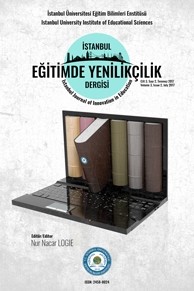TÜRKİYE’DE NÖROLOJİK REHABİLİTASYON KAPSAMINDA BİR MÜZİK TERAPİ PROJESİNİN GELİŞTİRİLMESİ
Serebral Palsi, inme, müzik terapi
TÜRKİYE’DE NÖROLOJİK REHABİLİTASYON KAPSAMINDA BİR MÜZİK TERAPİ PROJESİNİN GELİŞTİRİLMESİ
Cerebral palsy, stroke, music therapy,
___
- Bax, MCO., Flodmark, O., Tydeman, C. (2007) Definition and classification of cerebral palsy. From syndrome toward disease. Dev Med Child Neurol Suppl 109: 39-41
- Bradt, J., Magee, W.L., Dileo, C., Wheeler, B., McGilloway, E. (2010) Music therapy for acquired brain injury. Editorial Group: Cochrane Stroke Group . Published Online: 7 Jul 2010
- Dursun, E. ve diğ. (2016) Evaluation of dance therapy effects on gait pattern in patients with previous cerebrovascular events: Randomized study results from a single center. Edorium Journal of Disability Rehabilitation 2016;2:124–130.
- Dursun, M. ve diğ. (2015) Development of a music therapy Project in a neurological rehabilitation setting in Turkey. INEREM-İstanbul özet kitabı, OP 09, Syf.57
- Goldbeck, L. ve Ellerkamp, T. (2012) A Randomized Controlled Trial of Multimodal Music Therapy for Children with Anxiety Disorders. Journal of Music Therapy. Vol.49 No:4
- Gökbel, T. ve diğ. (2015) Treating Stroke Patients with Tango. INEREM-İstanbul özet kitabı, VP 01, Syf.123
- Herdender, M., Esposito, F., di Salle, F., Boller, C., Hilti, C. C., Habermeyer, B., et al. (2010). Musical training induces functional plasticity in human hippocampus. Journal of Neuroscience, 30(4), 1377–1384.
- Hürriyet Gazetesi (2015), http://www.hurriyet.com.tr/o-hastaliklar-icin-de-robotlatedavi-mumkun-29211268
- INEREM-2015 International Neurology and Rehabilitation Meeting, 4-6 haziran 2015. İstanbul, Türkiye.
- Jess-“Ortaya Konuşalım” TV programı (2015) https://www.youtube.com/watch?v= Ad9tH-wy3YE
- Kocaeli Gazetesi (2015), http://www.kocaeligazetesi.com.tr/turkiyenin-ilk-muzikoterapitoplulugu-goz-doldurdu-629570h.htm
- Karacan, Ç. ve diğ. (2015) Is Dance Therapy HElpful on Balance and Gait of Patients with Cerebral Palsy?.
- INEREM-İstanbul özet kitabı, P 136, Syf.121
- Lesiuk, T. (2010). The Effect of Preferred Music on Mood and Performance in a HighCognitive Demand
- Occupation. Journal of Music Therapy, Vol. 47, No. 2,
- Milliyet gazetesi (2015), http://www.milliyet.com.tr/kocaeli-universitesi-nde-felclihastalara-kocaeli-yerelhaber-638909/
- Mofredj, A., Alaya, S., Tassaioust, K., Bahloul, H. ve Mrabet, A. (2016) Music therapy, a review of the potential therapeutic benefits for the critically ill. Journal of Critical Care Vol. 35 195–199
- Nasuruddin, M.G. (2010) The Confluence Between Arts and Medical Science — Music and movement therapy for children with Cerebral Palsy. Malaysian Journal of Medical Sciences. Jul-sep 2010 17(3): 1-4
- Rosenbaum, P., Paneth, N., Leviton, A., ve diğ.(2007) A report: the definition and classification of cerebral palsy April 2006. Dev Med Child Neurol Suppl ;109: 8-14
- Schellenberg, E. G., & Peretz, I. (2008). Music, language and cognition: Unresolved issues. Trends in Cognitive Sciences, 12(2), 45–46.
- Scholz, D.S., Rohde, S., Nikmaram N., Brückner H.P, Grobach, M., Rollnik, J.D., Altenmüller, E.O.(2016)
- Sonification of Arm Movements in Stroke Rehabilitation - A Novel Approach in Neurologic Music Therapy. Frontiers in Neurology. 30;7:106
- Serrallach, B. Ve diğ. (2016). Neural Biomarkers for Dyslexia, ADHD, and ADD in the Auditory Cortex of Children. Frontiers Neuroscience. V. 10:324
- Sole, C. Mercadal-Brotons, M., Galati, A., De Castro, M. (2014). Effects of Group Music Therapy on Quality of Life, Affect, and Participation in People with Varying Levels of Dementia. Journal of Music Therapy. Vol. 51, No. 1
- ISSN: 2458-8024
- Başlangıç: 2015
- Yayıncı: İstanbul Üniversitesi
PROBLÉMATIQUE DE CONSTITUTION D’UNE GRILLE D’ANALYSE DE L’ORAL ÉMOTIONNEL
Freiderikos VALETOPOULOS, Julie RANÇON, Efi LAMPROU
TÜRKİYE’DE NÖROLOJİK REHABİLİTASYON KAPSAMINDA BİR MÜZİK TERAPİ PROJESİNİN GELİŞTİRİLMESİ
Beril Melina DURSUN, Soner AKYEL, Seda ŞEN, Çağla KARACAN, Begüm Çapa TAYYARE, Tuğba GÖKBEL, Yüksel TAŞÖREN, Erbil DURSUN
An Augmented Reality Interface for Choreography Generation
Tafadzwa Joseph DUBE, Gökhan KURT, Gökhan İNCE
OTİZMLİ ÇOCUKLARIN EĞİTİMİ İÇİN MOBİL UYGULAMA
Elif ŞENYÜREK, Deniz YILMAZ, Hatice KÖSE
MATEMATİK ÖĞRETİMİ İÇİN NOKTA BELİRLEME TEKNİĞİNE DAYALI BİR MOBİL UYGULAMA
Eren Deniz GENÇ, Hilal Nur ISSI, Oktay YILDIZ
ARTIRILMIŞ GERÇEKLİK TEKNOLOJİSİNİN VERİTABANI DERSİNDE KULLANIMI
Mehmet ALBAYRAK, Volkan ALTINTAŞ
AUGMENTED REALITY BASED DESKTOP HISTORY LECTURE: WONDERS OF THE WORLD WITH ANIMATED AGENTS
